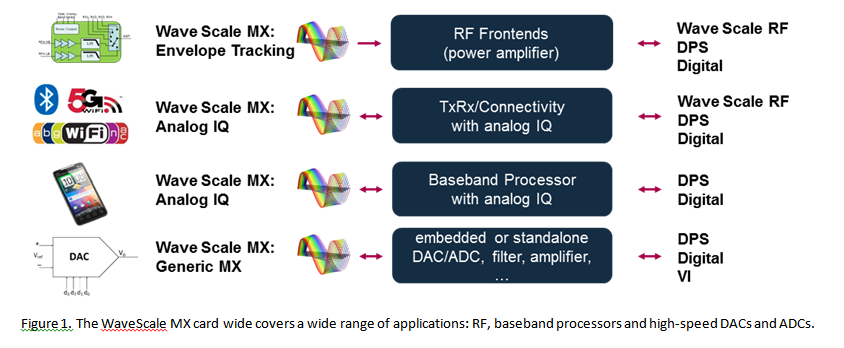Enabling High Throughput and Low Cost of Test for Analog Baseband Processors
By Mandy Davis, Business Development Manager, Advantest America
Analog baseband processors are communications workhorses. Digital processing streams must be manipulated into analog for amplitude, requiring they be encoded into a form suitable for transmission. The analog baseband processor tackles this encoding, converting the signal before it’s fed into a multiplexer that will place the baseband signal onto a relevant transmission channel.
Because they do so much heavy lifting, analog baseband processors require various types of function blocks. As chip integration has grown higher, so has the required performance for each block, e.g., processing speed of the microprocessor, bandwidth of the converters, etc. Some typical analog IP blocks include Transmit DACs (digital-to-analog converters), Receive ADCs (analog-to-digital converters), Audio DACs and Audio ADCs.
The Wave Scale Mixed-Signal High-Speed (WSMX HS) card, designed for use with the V93000 test platform, is Advantest’s next-generation analog card. Developed to address the requirements of these high-performance devices, the card contains both digitizers and arbitrary waveform generators (AWGs). It’s optimized for the latest baseband modulation schemes and is ready for 4G and 5G communication standards. To provide even more flexibility, WSMX can be used in combination with Advantest’s Wave Scale RF (WSRF) card, digital card, and Device Power Supply (DPS) card to address a broad range of applications, including RF, baseband processors and high-speed DACs and ADCs (see Figure 1).

The WSMX card uses the same type of per-pin architecture as the company’s other V93000 channel cards. None of the resources are shared, and all instruments are controlled in parallel and independently by the test processor, enabling faster test times. With 16 units per card that can be used as an AWG or digitizer, WSMX provides up to 32 instruments in a single card. This high density allows for increased multi-site test without requiring more cards to be added – in turn, contributing to lower test costs. Moreover, the card is scalable and licensable for as few as four units or as many as 16; therefore, the user doesn’t need to pay for all of the units if not all are required.
Measurement parameters for the WSMX card are among the best available in the industry, including a sample rate of 500 Megasamples per second (Msps) and bandwidth of up to 200MHz for the AWG, and a sample rate of 250Msps and bandwidth up to 300MHz for the digitizer. The WSMX card also includes a parametric measurement unit (PMU) per pin, for a total of 64 PMUs per card. With its per-pin PMU of ±3mV voltage accuracy and ±20nA current accuracy, the WSMX card provides all the performance necessary for DC measurements. It also includes a built-in flexible I/O matrix, so all functionality is available behind every pogo – each pin can operate as a PMU, AWG, or digitizer.
To summarize, the Wave Scale MX card tests analog baseband interfaces and high-speed DACs and ADCs, utilizing:
- 32 full independent instruments for true parallel mixed-signal test
- Test processor-controlled functionality
- Precise synchronization with all other resources in the tester
- Very high density with uncompromised mixed-signal test in the smallest infrastructure
As a result, WSMX delivers very high throughput and low test costs, while providing the high performance essential to analog/mixed-signal applications and high degree of scalability and flexibility for which the V93000 test platform is known.



